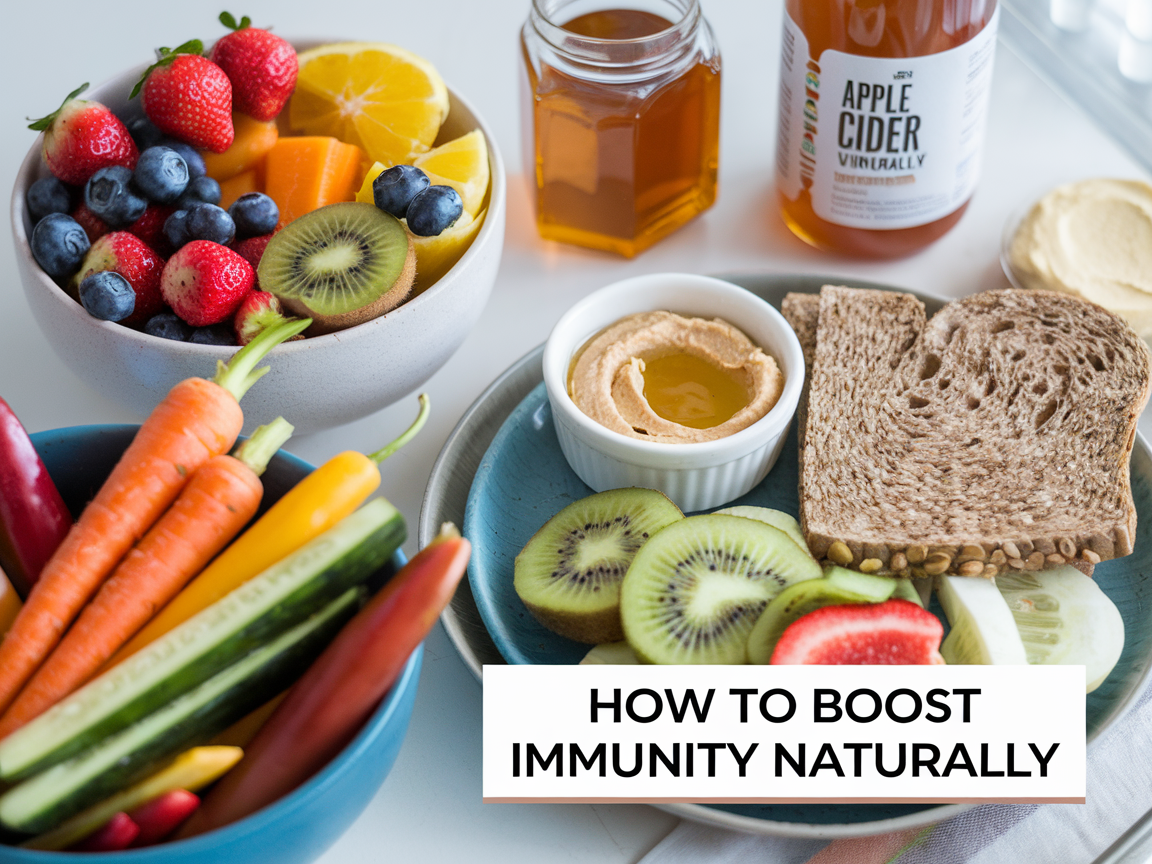In today’s fast-paced world, maintaining a robust immune system is crucial for overall health. The immune system acts as the body’s defense mechanism against infections and diseases. While medical interventions can be effective, boosting immunity naturally is not only safer but can also enhance your overall well-being. This comprehensive guide will explore various natural methods to boost immunity, supported by scientific research, practical tips, and lifestyle changes you can implement today.
Understanding the Immune System
What is the Immune System?
The immune system is a complex network of cells, tissues, and organs that work together to defend the body against harmful pathogens, including bacteria, viruses, and parasites. Understanding the components and functions of the immune system is essential for appreciating how to enhance its effectiveness.
Components of the Immune System
- White Blood Cells (Leukocytes): These cells are the main players in the immune system. They identify and destroy foreign invaders.
- Neutrophils: The first responders to infection, quickly moving to the site of invasion.
- Lymphocytes: These include T-cells and B-cells, which are essential for adaptive immunity.
- Lymphatic System: This system helps transport white blood cells and filters out pathogens through lymph nodes.
- Bone Marrow: This is where the majority of immune cells are produced. It is essential for the generation of blood cells, including white blood cells.
- Thymus: An organ located behind the sternum, where T-cells mature and learn to differentiate between the body’s cells and foreign cells.
- Spleen: The spleen filters blood and helps identify and eliminate pathogens.
The Role of Immunity in Health
A robust immune system plays a pivotal role in:
- Preventing Infections: A well-functioning immune system can ward off many common illnesses.
- Promoting Recovery: If you do become ill, a strong immune system can help you recover faster.
- Supporting Overall Health: Beyond just fighting infections, a healthy immune system supports general well-being.
Natural Ways to Boost Immunity

1. Nutrition: The Foundation of Immunity
Nutrition plays a crucial role in supporting immune function. A well-balanced diet provides essential nutrients that help the immune system operate efficiently.
Key Nutrients:
- Vitamin C: This vitamin is a powerful antioxidant that enhances the function of immune cells. Foods rich in vitamin C include citrus fruits, strawberries, kiwi, bell peppers, and broccoli.
- Vitamin D: Vitamin D is essential for immune function, helping to activate the immune system. Sunlight is a primary source, but you can also find it in fatty fish, fortified dairy products, and egg yolks.
- Zinc: This mineral is crucial for the development and function of immune cells. Foods high in zinc include meat, shellfish, legumes, seeds, and nuts.
- Antioxidants: Foods high in antioxidants, such as berries, nuts, and dark leafy greens, help reduce oxidative stress and inflammation.
Practical Tips:
- Aim for a rainbow on your plate by incorporating various fruits and vegetables.
- Consider a nutrient-dense smoothie with spinach, berries, and a scoop of protein powder.
2. Hydration: Water for Immunity
Staying hydrated is vital for maintaining a healthy immune system. Water is essential for transporting nutrients and flushing out toxins.
Benefits of Hydration:
- Aids Digestion: Proper hydration supports digestion and nutrient absorption, which are critical for overall health.
- Supports Immune Function: Adequate hydration helps maintain the production of lymph, which carries white blood cells throughout the body.
- Maintains Mucous Membranes: Hydration keeps mucous membranes moist, providing a barrier against pathogens.
Practical Tips:
- Keep a reusable water bottle handy to track your intake.
- Include herbal teas or infuse water with fruits for added flavor.
3. Sleep: Rest and Recovery

Quality sleep is one of the most effective ways to enhance your immune system. During sleep, the body undergoes critical repair processes, including the release of proteins called cytokines.
The Importance of Sleep:
- Enhances Immune Function: Sleep deprivation can lead to reduced immune response and increased susceptibility to infections.
- Supports Recovery: Quality sleep aids in muscle recovery and overall health.
Practical Tips:
- Create a bedtime routine to signal your body that it’s time to wind down. This could include reading, taking a warm bath, or practicing relaxation techniques.
- Limit screen time and exposure to blue light an hour before bed to improve sleep quality.
4. Exercise: Move for Immunity

Regular physical activity is essential for maintaining a healthy immune system. Exercise promotes good circulation, allowing immune cells to move freely throughout the body.
Benefits of Exercise:
- Reduces Inflammation: Regular exercise can lower levels of inflammation, which is beneficial for immune function.
- Boosts Mood: Physical activity releases endorphins, which improve mood and reduce stress.
- Improves Sleep Quality: Regular exercisers often report better sleep quality, further supporting immune health.
Practical Tips:
- Aim for at least 150 minutes of moderate aerobic activity each week, such as walking, cycling, or swimming.
- Incorporate strength training exercises at least twice a week to build muscle and enhance overall health.
5. Stress Management: The Impact of Stress on Immunity
Chronic stress can lead to increased cortisol levels, which can suppress the immune system. Effectively managing stress is vital for maintaining optimal immune function.
Techniques for Stress Reduction:
- Mindfulness and Meditation: Practicing mindfulness helps to reduce stress and improve mental clarity.
- Deep Breathing Exercises: Techniques such as diaphragmatic breathing can help activate the body’s relaxation response.
- Yoga and Tai Chi: These gentle physical activities promote relaxation and enhance overall health.
Practical Tips:
- Dedicate time each day for mindfulness or meditation practices.
- Explore online yoga classes or apps that offer guided sessions.
6. Herbal Remedies: Nature’s Immune Boosters

Certain herbs have been shown to enhance immune function. Integrating these into your diet can provide additional support.
Popular Immune-Boosting Herbs:
- Echinacea: Often used to prevent colds and respiratory infections, studies suggest it may enhance immune function.
- Garlic: Known for its antimicrobial properties, garlic has been shown to boost the immune response.
- Ginger: This anti-inflammatory herb may help reduce symptoms of infections and improve immune response.
Practical Tips:
- Consider herbal teas or supplements, but always consult with a healthcare provider for dosage and safety.
- Use fresh herbs in cooking to enhance flavor and health benefits.
7. Sunlight: The Natural Immune Booster
Sunlight exposure is vital for the production of vitamin D, which is essential for immune function.
Benefits of Sunlight:
- Vitamin D Production: Sunlight helps maintain healthy levels of vitamin D, which supports immune health.
- Mood Improvement: Exposure to sunlight increases serotonin levels, improving mood and overall well-being.
Practical Tips:
- Aim for 15-30 minutes of sunlight exposure daily, depending on skin type and weather conditions.
- During winter months or if you have limited sun exposure, consider vitamin D supplementation.
8. Maintain a Healthy Weight
Being overweight or obese can negatively impact immune function. Excess body fat is associated with chronic inflammation, which can hinder immune response.
Practical Tips:
- Focus on a balanced diet and regular exercise to maintain a healthy weight.
- Seek guidance from a healthcare professional for personalized weight management strategies.
9. Avoid Smoking and Limit Alcohol
Both smoking and excessive alcohol consumption can weaken the immune system, making the body more susceptible to infections.
Practical Tips:
- If you smoke, seek support to quit; this can significantly improve your overall health and immune function.
- Limit alcohol intake to moderate levels: up to one drink per day for women and two for men.
10. Stay Connected: The Importance of Social Support
Social connections can enhance emotional well-being and contribute to a healthier immune system. Positive relationships and social support can reduce stress and improve overall health.
Practical Tips:
- Engage in regular social activities, whether in-person or virtual.
- Foster strong relationships with family and friends to promote emotional health.
11. Incorporate Probiotics for Gut Health

The gut microbiome plays a significant role in immune health. A healthy gut can enhance the body’s ability to fight infections.
Benefits of Probiotics:
- Supports Gut Flora: Probiotics help maintain a healthy balance of gut bacteria, which can influence immune function.
- Reduces Inflammation: A balanced gut microbiome can help lower systemic inflammation.
Practical Tips:
- Include fermented foods in your diet, such as yogurt, kefir, sauerkraut, kimchi, and kombucha.
- Consider probiotic supplements if dietary sources are insufficient, but consult a healthcare provider first.
12. Practice Good Hygiene
Maintaining good hygiene is a simple yet effective way to prevent infections and support your immune system.
Practical Tips:
- Wash your hands frequently, especially before meals and after being in public places.
- Keep your living space clean and sanitized to minimize exposure to pathogens.
Conclusion
Boosting your immunity naturally involves a holistic approach that incorporates nutrition, lifestyle changes, and emotional well-being. By making small, consistent changes in your daily routine, you can enhance your immune function and promote overall health. Remember, a strong immune system is your body’s best defense against illness, so prioritize your health today!
FAQs
1. What is the best way to boost immunity naturally?
A combination of a balanced diet, regular exercise, sufficient sleep, stress management, and hydration are essential for boosting immunity naturally.
2. Can certain foods enhance immunity?
Yes, foods rich in vitamins C and D, zinc, and antioxidants—such as fruits, vegetables, nuts, and seeds—can support immune health.
3. How much sleep do I need for optimal immunity?
Most adults need 7-9 hours of quality sleep each night to maintain optimal immune function.
4. Is it possible to have too much exercise?
Yes, excessive exercise without adequate rest can lead to fatigue and decreased immunity. Aim for a balanced routine that includes rest days.
5. Are herbal supplements effective for boosting immunity?
Some herbs, such as echinacea and garlic, have shown potential benefits for immune health. However, consult a healthcare provider for guidance on usage and dosage.
6. How does stress affect the immune system?
Chronic stress can lead to elevated cortisol levels, which can suppress immune function and increase susceptibility to illness.
7. Can I get enough vitamin D from food alone?
While some foods contain vitamin D, sunlight exposure is a significant source. Consider supplementation if you’re not getting enough from diet and sun exposure.
8. What lifestyle changes can I make to improve my immune health?
Incorporate a balanced diet, regular exercise, quality sleep, stress management techniques, and avoid smoking and excessive alcohol consumption.
9. How long does it take to see improvements in immunity?
Improvements can vary, but adopting healthy lifestyle changes can lead to noticeable benefits in a few weeks to months.
10. Can I take vitamin supplements to boost my immune system?
While supplements can help fill nutritional gaps, it’s best to obtain nutrients from a balanced diet. Consult a healthcare provider before starting any new supplements.




Your articles are extremely helpful to me. Please provide more information!
Thank you for your articles. They are very helpful to me. May I ask you a question?